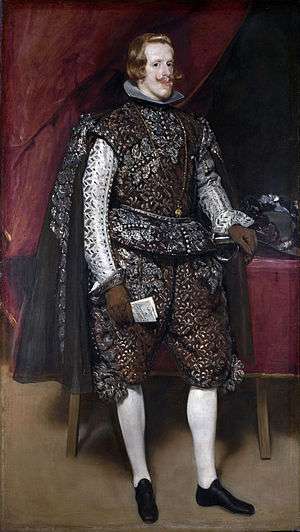Philip IV in Brown and Silver
 | |
| Artist | Diego Velázquez |
|---|---|
| Year | 1635 |
| Medium | oil on canvas |
| Dimensions | 199 cm × 113 cm (78 in × 44 in) |
| Location | National Gallery, London |
The Portrait of Philip IV or Philip IV in Brown and Silver is a portrait of Philip IV of Spain painted by Diego Velázquez. It is sometimes known as Silver Philip and is now in the National Gallery in London. It was the main portrait of Philip painted by Velázquez in the 1630s, used as the model for many workshop versions.[1]
The date of the work is not certain – the National Gallery website gives 1631/32, whilst Carrassat gives 1635 – but it was definitely the first portrait the artist produced after his first trip to Italy, in that it adopts the softer and more colourful palette of the Venetian school. There is some evidence that the portrait may have taken a number of years to complete, accounting for the uncertainty.[2] Life size, it is unlike most portraits of Philip IV, in that it does not show him in his usual wholly black costume. Instead it shows him in a brown and silver embroidered costume (thus giving the portrait its name), painted with small rapid strokes, and wearing the insignia of the Order of the Golden Fleece on a golden chain. There are several pentimenti that fine tune the composition. The signature is on the letter Philip holds, a fictive petition from the painter to him. This is a sign of the importance Velázquez attached to the work, as he only signed a few of his paintings.[3]
Provenance
It was almost certainly the painting on display in the library at the Escorial outside Madrid from the mid-17th century until 1809, when it was removed on the orders of Joseph Bonaparte, who had been placed on the throne of Spain by his brother Napoleon. He presented it to a General Desolle, despite a civil servant asking him to present a less important work. Desolle's daughter sold it after the general's death to the English collector William Thomas Beckford, on whose death in 1844 it was inherited by his son-in-law, the 10th Duke of Hamilton. It was bought by the National Gallery for £6,300 at the 1882 Hamilton Palace Sale, a very high price for a Spanish painting at the time.[4]
Notes
References
- Carrassat, P.F.R., Maestros de la pintura, Spes Editorial, S.L., 2005. ISBN 84-8332-597-7
- Neil MacLaren, revised Allan Braham, The Spanish School, National Gallery Catalogues, 1970, National Gallery, London, ISBN 0-947645-46-2
- Reitlinger, Gerald; The Economics of Taste, Vol I: The Rise and Fall of Picture Prices 1760–1960, Barrie and Rockliffe, London, 1961
Further reading
- Carr, Dawson W. and Bray, Xavier (eds.), Velázquez, 2006, National Gallery London, ISBN 1-8570-9303-8
- Velázquez , exhibition catalog of 1990 from The Metropolitan Museum of Art (fully available online as PDF), which contains material on this painting (see index)
